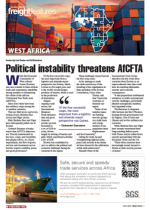Instability, climate change and population growth across West Africa directly impact logistics supply chains.A study published in ScienceDirect by Keigo Shibuya, Ryuichi Shibasaki, Tomoya Kawasaki, and Tomomi Tokuori, predicts that the port of Abidjan in Côte d’Ivoire could experience additional demand due to instability affecting cargo f lows through the other major ports of Dakar (Senegal), Tema (Ghana), Lome (Togo) and Cotonou (Benin).They provide the gateways for a network of economic corridors and regional economic communities, which are designed to promote infrastructure development and integrate logistics policies.A simulation model developed by the researchers identified the Port of Abidjan as the preferred call for liner operators, providing the border crossing with Burkina Faso remains open and efficiencies increase.This would draw liner services to the port of Abidjan, which is already one of the busiest container terminals in the region. Burkina Faso provides a link to Niger and Mali. In November 2022 APM Terminals (APMT) and Bolloré commissioned a second container terminal in the port of Abidjan.This doubled the port’s annual capacity to three million TEUs, according to APMT. It is the only port in the region catering for vessels with a 16-metre draught. Having a reliable port gateway connected through efficient logistics links is vital for the provision of aid and to open economic prospects for the region, whose population is growing rapid ly.The Economist Global Maritime Trends 2050 publication predicts that household consumption in Africa will reach $2.5 trillion in 2030, up from $1.1trn in 2015. Nigeria will lead the growth at 20%, followed by Egypt (17%) and South Africa (11%).“In this context, countries will need to invest in increasing the efficiency and resilience of their ports and logistics infrastructure to keep up with growing demand for imports and consumption,” the report states. West African logistics companies are already seeing the impact of changes in population dynamics – brought about largely through security and climate issues. The World Bank estimates that up to 86 million Africans will have to migrate within their own countries by 2050 as regions become unliveable.

